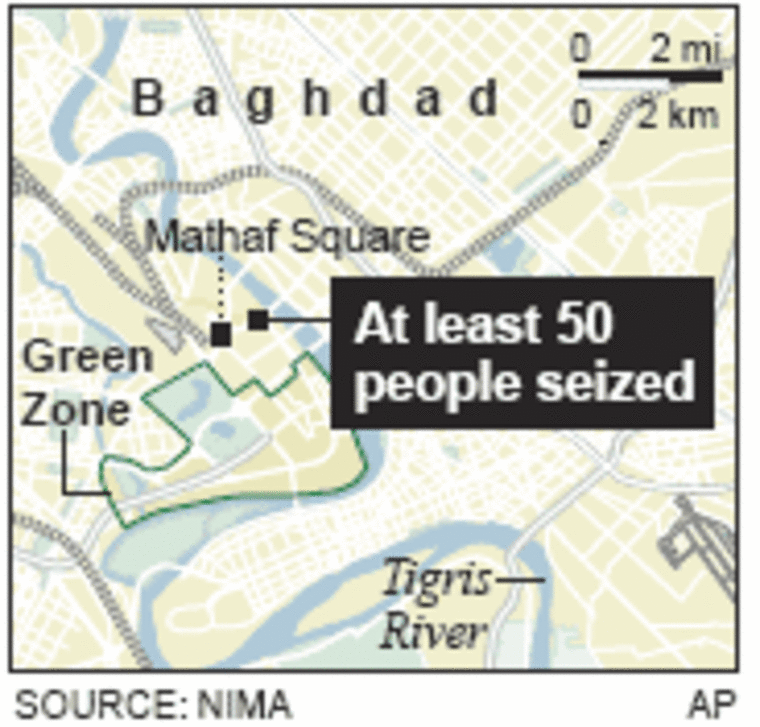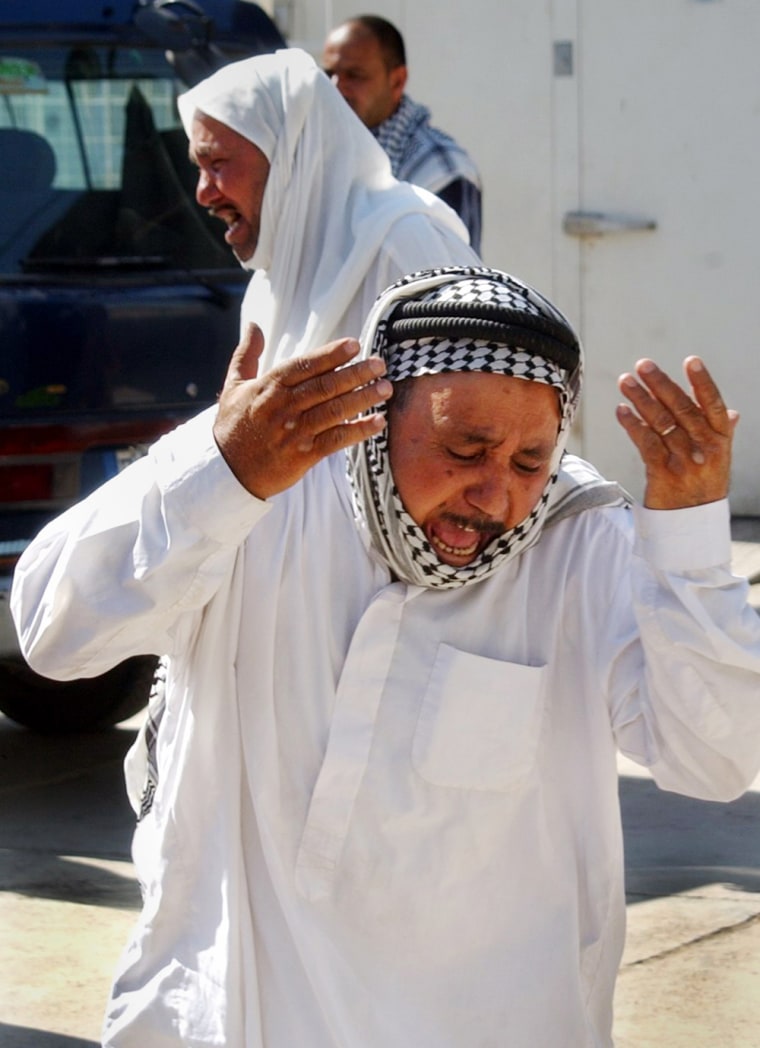Gunmen in police uniforms staged a brazen daylight raid on bus stations in central Baghdad on Monday, kidnapping at least 50 people, including travelers, merchants and vendors selling tea and sandwiches.
The operation was a direct challenge to Prime Minister Nouri al-Maliki’s efforts to restore security in the capital, which has been hard hit by suicide attacks, roadside bombs and sectarian death squads.
Gunmen arrived at midmorning Monday and began randomly grabbing people in the shabby business district, where several transportation companies are based and buses pick up passengers bound mostly for Jordan, Syria and Lebanon, Lt. Col. Falah al-Mohamedawi said. Both Shiites and Sunnis work in the area.
The attackers blocked the roads and beat people before putting bags on the captives’ heads and leading them to vehicles one-by-one, a witness told an Iraqi television station. They herded their victims into more than a dozen vehicles, according to witnesses and officials.
“They took all the workers from the companies and nearby shops,” said Haidar Mohammed Eleibi, who works for the Swan Transportation Co. in the Salihiya area.
He said his brother and a cousin were among those taken away, along with merchants, passers-by and even men selling tea and sandwiches.
“They did not give any reason for it,” he said. “Police came afterward and did nothing.”
Another transportation worker, Amjad Hameed, said 15 cars rushed into the area and the random seizures began. “We asked them why, but nobody replied,” he said.
Shiite ministry denies involvement
The Shiite-dominated Interior Ministry, which oversees the police and has been accused of backing militias in sectarian violence, denied its forces were behind the attack.
Al-Mohamedawi and the ministry said at least 50 people were abducted.

There have been other mass kidnappings in Iraq. In a similarly audacious attack, gunmen dressed as Interior Ministry commandos stormed into the al-Rawafid Security Co.’s east Baghdad headquarters and took away 50 people, many of them former military personnel from Saddam Hussein’s regime. Those workers have not been heard from since the March 8 attack.
Monday’s kidnapping was the latest in a series of setbacks for al-Maliki. The Shiite prime minister has also been frustrated in his efforts to crack down on sectarian and militia violence in the oil-rich southern city of Basra, where attacks have been unabated despite his declaration of a state of emergency on Wednesday.
And al-Maliki still has not been able to reach consensus among Iraq’s ethnic and sectarian parties on candidates for interior and defense minister — posts he must fill to implement his ambitious plan to take control of Iraq’s security from U.S.-led forces within 18 months.
Pressure on government
Former Prime Minister Ayad Allawi’s secular Iraqi List party criticized the latest delay in announcing the new ministers, insisting “they should be national independent figures.” Lawmaker Hameed Majid Mosa called on al-Maliki to use his constitutional authority to fill the posts.
The State Department also stressed the importance of filling the positions to complete al-Maliki’s government of national unity, which took office just over two weeks ago.
“I know that there are very active discussions under way right now to fill those positions. We think that that is important. We hope that that, in fact, occurs in the very near future,” State Department spokesman Sean McCormack said.
“That will send an important signal to the Iraqi people that they have a full government working on their behalf, especially in those positions where you would have individuals that would be free from the taint of association with militias,” he added.
The Bush administration hopes a unity government will drain support for the Sunni-led insurgency and restore order in Baghdad and elsewhere in the country, enabling the United States to begin withdrawing its forces.
1,500 U.S. forces move into Anbar
In the meantime, about 1,500 U.S. combat troops have been moved from Kuwait to Sunni-dominated Anbar province some 70 miles west of Baghdad to help restore order.
On Monday, U.S.-led forces fired artillery at the train station in Anbar’s provincial capital of Ramadi, “targeting four military-aged males unloading a weapons cache.”
A hospital official, Dr. Omar al-Duleimi, said American forces killed five civilians and wounded 15. The U.S. military said the mission had “positive effects on the target,” but it denied that civilians were killed or injured in the city west of the capital.
The influential Sunni Association of Muslim Scholars warned the U.S.-backed Iraqi government against participating in any assaults in Anbar, a vast province that stretches from western Baghdad to the borders with Syria and Jordan.
“Its consequences would be very dangerous for the Iraqi society and for the government,” said Mohammed Bashar al-Faidi, a spokesman for the Sunni group, which is believed to have links to insurgents.
Al-Maliki has said his government was working on a plan to restore security to Ramadi and that Iraqi forces would work with U.S. troops.
Killing persists in Baghdad
At least 17 killings were reported across the country Monday, including a Shiite school guard and two Sunni brothers who were shot to death as they were driving to college in the capital. Iraqi police found the blindfolded and bound body of a man who had been shot in the head and chest and another body that had been shot in the head in separate locations in Baghdad.
There were also unconfirmed reports that gunmen may have killed at least 11 college students in Baghdad’s southern Dora district.
According to Capt. Jamil Hussein of the al-Yarmouk police station, gunmen opened fire on a minibus in Dora’s predominantly Sunni Arab Mahdiya neighborhood. He said 11 people were killed, but Al-Yarmouk hospital reported receiving only two bodies from a shooting. It was unclear if the victims were Sunni or Shiite.
There was no one available at Baghdad’s main morgue to confirm if it had received any bodies.
On Sunday, masked gunmen stopped two minivans carrying students north of Baghdad, ordered the passengers off, separated Shiites from Sunni Arabs, and killed the 21 Shiites “in the name of Islam,” a witness said.
In southern Iraq, an explosive device went off near an Italian patrol Monday night, killing one Italian soldier and wounding four, Adm. Gianpaolo Di Paolo announced in Rome. The military said the blast occurred about 60 miles north of Nasiriyah, where the Italians are based.
Man sentenced in aid worker’s abduction
Separately, a 30-year-old Iraqi man accused of helping the kidnappers of aid worker Margaret Hassan was sentenced to life in prison, while two other suspects were acquitted, a court official said.
Hassan, 59, the director of CARE international in Iraq and a citizen of Britain, Ireland and Iraq, was abducted in Baghdad in October 2004. She was killed a month later. Her body has never been found.
